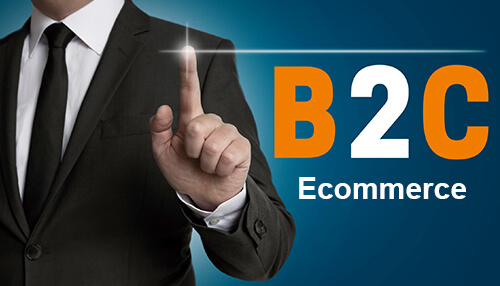Introduction
B2C e-commerce is defined as the practice of businesses selling directly to consumers. B2C e-commerce has a market value of USD 3.67 trillion in 2020, and it is anticipated to increase at a CAGR OF 9.7% from 2021 to 2028. And a lot of businesses, like Amazon, have already taken advantage of B2C eCommerce by selling their product straight to customers. You decide to launch an e-commerce company after considering the size of the market.
However, you must be aware of both the benefits and drawbacks of B2C e-commerce before beginning. You will learn about the opportunities and difficulties of conducting B2C campaigns. Let us start discussing the advantages and disadvantages of B2C eCommerce:
Advantages of B2C eCommerce
The following are some of the top advantages of B2C eCommerce:
1. The inflexibility of the catalog
The direct “link” characteristic has the remarkable capacity to display a huge range of content material facts and visually attractive factors, which might already be gifted on the websites owned by our numerous consumers. With this revolutionary function, there’s surely no want that allows you to implore or rely on the services of any marketing consultancy organisation. The direct “hyperlink” empowers you to take control of your personal online presence and effortlessly showcase your website’s current content material and visible assets to your target market, ensuring maximum visibility and effect.
2. Shrinks Competition Gap
One advantage we’ve got is the affordability of our marketing and advertising, which permits us to go head-to-head with mounted organisations about offering, within your means, first-rate merchandise that might be easily handy to clients. This price-effectiveness in selling our objects opens up possibilities for us to efficaciously take care of well-known manufacturers and meet the demands of our target market in terms of price, exceptional quality, and comfort.
3. Unlimited Market Place
By providing a platform in which customers can easily browse and store merchandise at any time, online shops have opened up a sizable and untapped marketplace. As a result, those shops now do not require the offerings of an advertising and marketing consulting company, as they’ve efficiently created a self-maintaining environment for clients to make purchases at their own comfort.
4. 24-Hour Store with a Shorter Sale Cycle
It is unnecessary to send prolonged emails that include a surplus of statistics or make an immoderate number of cellphone calls that can be considered redundant.
5. Lower Cost of Business
The B2C (business-to-client) version has extensively reduced the charges associated with various elements of accomplishing business. These consist of the charges related to staffing, such as income prices, recruitment costs, and training charges. In addition, the implementation of B2C has introduced a lower price range within the allocation of price ranges towards making purchases, whether or not it’s for stock or supplies wished for every day operations.
The need for mailing confirmations has also faded because the method can now be automated and done electronically, saving on postage fees and the need for a bodily garage of statistics. Moreover, the reliance on cellphone conversations has been eased, thanks to the availability of online verbal exchange channels and powerful messaging systems.
Furthermore, B2C has helped streamline clerical work by automating repetitive administrative duties and lowering the allocation of assets towards guided hard work. Lastly, the B2C model has eliminated the need for establishing physical locations, resulting in a main cost discount in terms of property rental, protection, and different related charges.
6. Eliminating Third Party Clients
In order to maximise performance and keep control over our business operations, we keep the freedom to without delay sell our services or products to clients, bypassing the need for any intermediaries or middlemen in the transaction method.
7. Business Administration Made Simpler
Compared to the conventional methods of business administration, it has become simpler to record store inventories, shipments, logs, and all other business operations.
Disadvantages of B2C eCommerce
The following are some of the top disadvantages of B2C eCommerce:
1. Lack of Catalogue Flexibility
However, it’s crucial to rearrange the catalogue after adding new data and merchandise, respectively.
2. Infrastructure
Even though it has a large patron reach and is ready to overcome cultural obstacles by means of addressing everyone at the same time, it is crucial to know that reality still stays unchanged and unalterable, regardless of these elements.
Despite its widespread reach and ability to connect with people from numerous cultures, it’s vital to take into account that the fact continues to exist as is, without any effect or modification from such factors.
3. Competition
Since there are thousands of online stores and services, the rivalry is indeed fierce and could jeopardize our company’s consumer base. Some online stores have been able to keep a sizable portion of the market, allowing them an opportunity to endure over time.
4. Product Exposure Limits
It is important to note that e-commerce has limited the amount of product exposure available to purchasers online, although it provides them with easy accessibility and a special degree of product customization.
5. Entering a Cut-Throat Competition
Without conducting market research and B2C campaigns, many people are influenced to launch a B2C e-commerce business. As a result, they begin to cater to the market or special segment where numerous e-commerce companies have already been created to serve the public.
6. Shipping Charges
Whether you promote merchandise or items in large or small quantities, it’s a plain truth that transportation fees could be incurred. Moreover, in the modern generation of e-commerce, clients have come to assume not only top-notch products but also free shipping as standard. Consequently, corporations have to recollect the impact of these additional fees on their profit margins and locate innovative methods to fulfill their clients’ needs.
7. Security Concerns
The transactional data from your site can be hacked by a lot of cybercriminals. After that, they are free to use someone else’s name to purchase anything they want.
Conclusion
The above advantages and disadvantages of B2C eCommerce help you understand the establishment of the B2C eCommerce business in detail. So, write up your business plan while considering all of the above opportunities and challenges.




